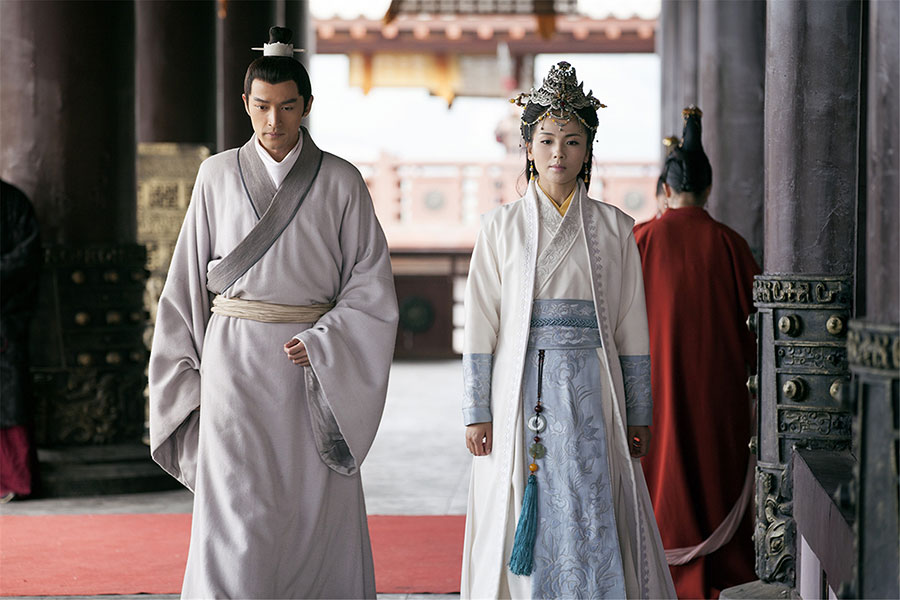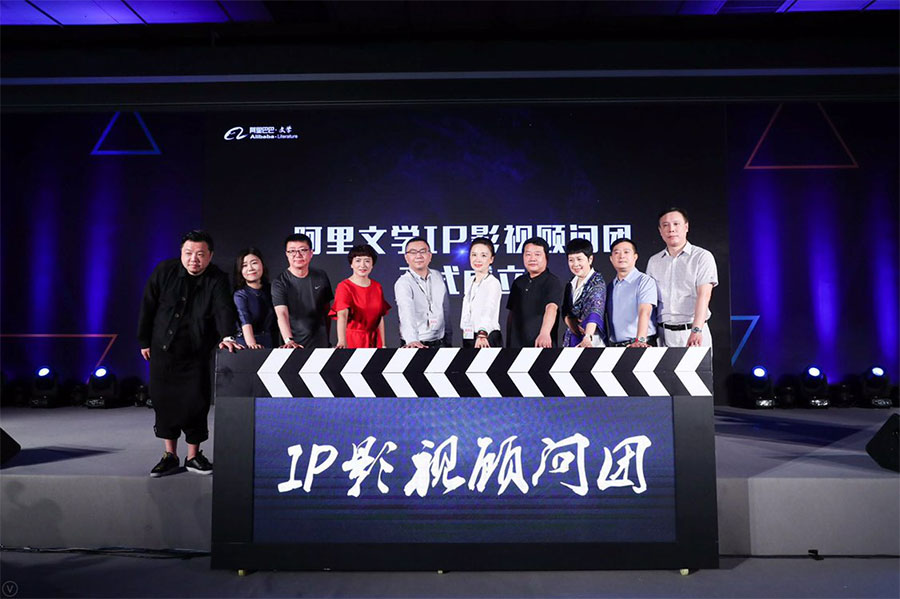
TV drama Nirvana in Fire, adapted from online literature, has become a hit. [Photo provided to China Daily]
Most online writers face a similar struggle when it comes to seeing their work being adapted for the screen-the uncompromising "battle" between imagination and reality, whether it's the practicalities of filming, or budget constraints.
"In a novel, you can write a spectacular underwater abyss that is as deep as 500 meters, but in the real world it might just be a three-meter-deep water tank on a green-screen-covered soundstage," says Dong Junjie, a popular online writer better known by his pseudonym, Piaoqi (an honorary title for an ancient general).
The 40-year-old, whose latest work is a 15-book franchise about Chinese military heroes who save the world, is one of the latest authors who is set to benefit from a project to coach writers in the skill of making stories easier for screen adaptation.
Internet giant, Alibaba, recently announced that its subsidiary, Alibaba Literature, in a first-of-its-kind initiative, had signed up 11 top movie and television producers to serve as consultants to coach online writers.
The panel of big-name tutors include Dun Qi, known for producing the hit royalty-themed drama Legend of Mi Yue, Li Xiaowan, producer of the 2010 hit TV series The Dream of Red Mansions, and award-wining producer Bai Yicong, a veteran specialist in producing online fantasy and suspense stories.

Lost in Time, a psychological suspense thriller, will be aired online on June 29. [Photo provided to China Daily]
Seeing the rapid growth of China's online entertainment industry, Alibaba recently launched a series of projects to expand its foray into the "pan-entertainment" sector, which seeks to link literature, movies, TV series and sports, during the Shanghai International Film and TV Festival's Internet Summit, which took place between June 15 and 18.
Among all the categories which have the potential to really take off, literature has the most enduring charm, says Yu Qian, chief executive officer of Alibaba Literature.
"Literature is not only the source for movies and TV shows, but also the touchstone to pre-build a fan base," he explains.
Citing such cases like The First Half of My Life and In the Name of People, two hit TV series adapted from best-selling novels, Yu says that works of literature have become a pivotal source for movies and TV shows in recent years, exemplified by the fact that's where six out of the 10 highest-rated TV dramas in 2017 were adapted from.

Alibaba Literature invites 11 movie and TV show producers to serve as consultants and help online writers produce novels easier to be adapted for screen productions. [Photo provided to China Daily]
Latest statistics released by the China Writers Association in May show that readers of online literature reached 378 million by the end of last year, among which 344 million, or 91 percent, enjoy reading novels on their smartphones.
Additionally, nearly 2,000 movies, 1,232 TV dramas and 712 animated series built their stories from works of literature last year, according to the association.
"Online literature has developed over the last 20 years, but 2015 marked a turning point," says Dong, who alongside another two writers, Lu Xiaoning and Yuan Rui, all signed with Alibaba Literature to license their work for release on its platform on June 17.
Lu, better known by his pen name Cangtian Baihe (a white crane in high sky), specializes in fantasy novels, and Yuan, whose pseudonym is Jingye Jisi (pondering in a tranquil night), has seen his police-themed novels accumulate more than one billion online clicks.
Boosted by the unprecedented growth of the Chinese movie and television industries, a number of cash-rich investors raced to purchase quality stories suitable for screen adaptation in 2015. "The income I earned in 2015 surpassed all my earnings over the past decade," says Dong, who began to write online novels in 2003.
The soldier-turned-writer is working on adapting three of his novels into scripts, which are due to begin filming in March next year. He says more and more of his fellow online writers have started producing screenplays in accordance with Alibaba's expansion in the field.

Lost in Time, a psychological suspense thriller, will be aired online on June 29. [Photo provided to China Daily]
Nearly 2,200 online movies have been produced since such films tailored to video-streaming services hit the market on a large scale in 2015-usually lasting only 60 minutes, or half the length of a theater-release feature.
Online distribution, which previously accounted for, at most, 10 percent of a movie's entire revenue, has now risen to almost 30 percent, says Liu Kailuo, vice-president of Alibaba-owned video streaming site Youku.
Predicting that the online movies' box office will break the milestone 3 billion yuan ($466 million) this year, Liu says Youku has introduced some experimental ways to improve the appeal for online audiences.
These include shooting movies tailored for vertical screen orientation, the normal way that people look at their smartphones, as well as adding interactive content, such as including a director's explanation with the movie.
Also, the video giant will produce a range of new mini-series, running for a maximum of five episodes with each lasting no longer than 90 minutes. Future Disease, adapted from sci-fi novelist Chen Qiufan's collection of the same name about a series of weird incidents in a futuristic world, will be just such a mini-series and is expected to start filming next year.
Youku's forthcoming lineup also includes Lost in Time, a psychological suspense tale set in an underground train, and Hero Song, a coming-of-age movie about a traditional musical art from Guangdong province.
"Each year, only around 10 percent of the 700 or so feature-length movies will earn a profit. With a smaller budget and unlimited release span, online titles will offer young creators more freedom to focus on exploring the diversity of cinema," says veteran scriptwriter Shu Huan.


